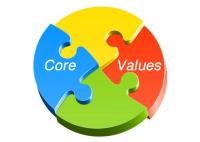What is the Impact of a CEO on the Organizational Culture
09 Mai 2013
Values are those who define and guide our way in life. In all its areas: personal aspirations, interests, beliefs, career path. They tell us about what we want to achieve, with who we want to travel along, both in business and day to day life. They tell about what we appreciate, stand up for, fight for and about things, areas of interests and people we will not click with.
When we talk about professional life, values are the ones that explain why a person wants certain things, has certain aspirations, appreciates certain behaviors in other people. Have you ever wondered why companies’ cultures are different? Well, companies are run by different leaders, with different values, who care about different things. And leaders at the top are those who shape organizational culture.
Let’s think about J.F. Kennedy’s dream, and how he expressed it in a memorable speech. To be the first nation that puts the foot on the Moon. “We choose to go to the moon”, he said. “We choose to go to the moon in this decade and do the other things, not because they are easy, but because they are hard, because that goal will serve to organize and measure the best of our energies and skills, because that challenge is one that we are willing to accept, one we are unwilling to postpone, and one which we intend to win, and the others, too. “
Let’s imagine what type of culture such a leader will create around him. Probably the heroes of the organization will be those full of passion, believing first step in uncertain water is feasible, those who would fight for big unrealistic ambitions, and those who strive for achievement, success, career fulfillment.
Prof dr. Robert Hogan, one of the most reputable figures in personality study and leadership research, talks about 10 core values and drivers that can define a person’s identity, philosophy of life, career interests, beliefs.
- Recognition – Concerns valuing fame, visibility, and publicity; interested in being known and recognized. In high Recognition cultures, accomplishment, productivity, and apparent success are recognized in a prompt and public fashion.
- Power – Concerns valuing competition, achievement, and being perceived as influential; interested in challenge, competition, and a lifestyle organized around worldly success. A high Power culture one that is primarily concerned with results. This culture is aggressive, competitive, and results-oriented.
- Hedonism – Concerns valuing fun, good company, and good times; interested in pleasure, excitement, and variety. A high Hedonism culture is characterized by an ethos of work hard/play hard; people strive to perform at a high level, and then periodically take time to relax, celebrate, and have a good time together
- Altruism – Concerns actively helping others and improving society; interested in providing good customer service and building a better workplace. A high Altruistic culture is one that cares about others and puts a premium on the welfare and well-being of the staff – people are encouraged to develop their talents.
- Affiliation – Concerns valuing frequent and varied social interaction; interested in networking and feeling a sense of belonging to a group or organization. A high Affiliation culture is characterized by team work and social interaction, with practices and procedures designed to maximize social contact.
- Tradition – Concerns valuing similarity between the organization’s and the employee’s perspectives on tradition, history, and old-fashioned virtues. A high Tradition culture is one that believes that hierarchy and conformity are of utmost importance. There are also symbols attesting to the organization’s deep respect for its history.
- Security – Concerns valuing certainty, predictability, and risk-free environments; interested in structure, order, predictability, and planning for the future. A high Security culture is one that has little tolerance for risk and unpredictability. These will include security procedures, access codes, oversight plans, and an overarching emphasis on minimizing risk.
- Commerce – Concerns valuing business activities, money, and financial gain; interested in earning money, realizing profits, finding business opportunities, and making investments. A high Commerce culture is all about money, as it emphasizes profitability and cost containment. There is a constant, relentless focus on the bottom line.
- Aesthetics – Concerns valuing creative and artistic self-expression; interested in quality, product look and feel, and attractive surrounding. A high Aesthetics culture is concerned with appearance and is characterized by a self-conscious attention to style, appearance, quality, and good taste.
- Science – Concerns valuing ideas, technology, and rational problem solving; interested an analytical approach to solving problems and understanding how things work. A high Science culture is concerned with data and accuracy, and can be characterized by an emphasis on the rigor and defensibility of plans, goals, decisions, and public statements.
The people in organizations stay and leave. They zig or they zag. They feel they belong or not at all. This dynamics is dictated largely by the good or bad match between individuals’ values and organizational values. Selection based on values is important if we want employees to stay and feel satisfied with what the company stands for. They have to fit into the bigger dream if we want them to be loyal and motivated. They have to fit the culture top leaders and CEO’s drive, based on their core personal values.
More about Romanian leadership styles and values you can learn during the HART Consulting conference on the 22nd of May.
Madalina Balan is specialized in organizational psychology, psychologist, Managing Partner and Senior Consultant at HART Consulting. Madalina is certified in Hogan Assessment methodology since 2007 and the Master trainer for Romania and Moldova in this methodology. With more than 12 years` experience as a trainer and consultant in human resources, Madalina has managed various projects on talent management, selection and leadership development for manifold Romanian and multinational organizations.
Madalina Balan
Managing Partner
HART Consulting
A material published in Romania-Insider





